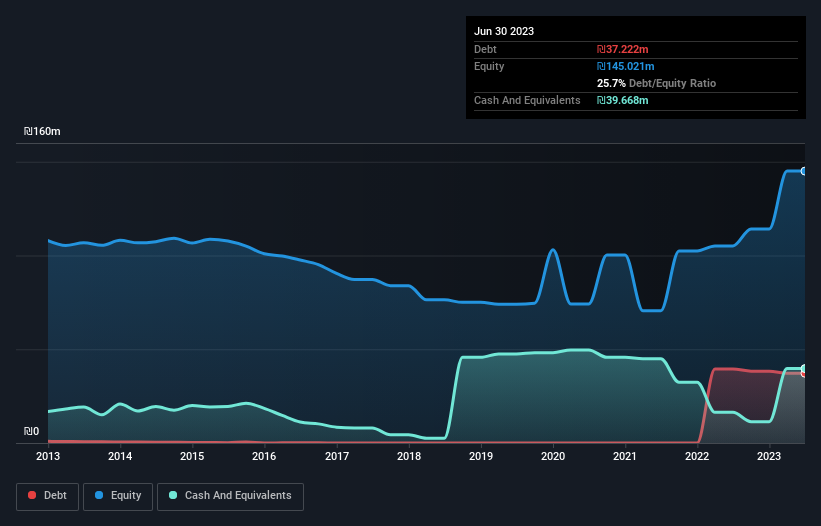- Israel
- /
- Electrical
- /
- TASE:AUIS
Does E.S. Australia Israel Holdings (TLV:AUIS) Have A Healthy Balance Sheet?

Legendary fund manager Li Lu (who Charlie Munger backed) once said, 'The biggest investment risk is not the volatility of prices, but whether you will suffer a permanent loss of capital.' When we think about how risky a company is, we always like to look at its use of debt, since debt overload can lead to ruin. We note that E.S. Australia Israel Holdings Ltd (TLV:AUIS) does have debt on its balance sheet. But the real question is whether this debt is making the company risky.
When Is Debt A Problem?
Debt is a tool to help businesses grow, but if a business is incapable of paying off its lenders, then it exists at their mercy. If things get really bad, the lenders can take control of the business. While that is not too common, we often do see indebted companies permanently diluting shareholders because lenders force them to raise capital at a distressed price. Having said that, the most common situation is where a company manages its debt reasonably well - and to its own advantage. When we think about a company's use of debt, we first look at cash and debt together.
View our latest analysis for E.S. Australia Israel Holdings
What Is E.S. Australia Israel Holdings's Net Debt?
As you can see below, E.S. Australia Israel Holdings had ₪37.2m of debt at June 2023, down from ₪39.4m a year prior. However, its balance sheet shows it holds ₪39.7m in cash, so it actually has ₪2.45m net cash.

How Healthy Is E.S. Australia Israel Holdings' Balance Sheet?
Zooming in on the latest balance sheet data, we can see that E.S. Australia Israel Holdings had liabilities of ₪9.23m due within 12 months and liabilities of ₪40.0m due beyond that. On the other hand, it had cash of ₪39.7m and ₪2.57m worth of receivables due within a year. So it has liabilities totalling ₪7.00m more than its cash and near-term receivables, combined.
Given E.S. Australia Israel Holdings has a market capitalization of ₪66.1m, it's hard to believe these liabilities pose much threat. Having said that, it's clear that we should continue to monitor its balance sheet, lest it change for the worse. While it does have liabilities worth noting, E.S. Australia Israel Holdings also has more cash than debt, so we're pretty confident it can manage its debt safely.
Notably, E.S. Australia Israel Holdings made a loss at the EBIT level, last year, but improved that to positive EBIT of ₪3.2m in the last twelve months. There's no doubt that we learn most about debt from the balance sheet. But it is E.S. Australia Israel Holdings's earnings that will influence how the balance sheet holds up in the future. So if you're keen to discover more about its earnings, it might be worth checking out this graph of its long term earnings trend.
Finally, while the tax-man may adore accounting profits, lenders only accept cold hard cash. E.S. Australia Israel Holdings may have net cash on the balance sheet, but it is still interesting to look at how well the business converts its earnings before interest and tax (EBIT) to free cash flow, because that will influence both its need for, and its capacity to manage debt. Over the last year, E.S. Australia Israel Holdings reported free cash flow worth 3.0% of its EBIT, which is really quite low. That limp level of cash conversion undermines its ability to manage and pay down debt.
Summing Up
While E.S. Australia Israel Holdings does have more liabilities than liquid assets, it also has net cash of ₪2.45m. So while E.S. Australia Israel Holdings does not have a great balance sheet, it's certainly not too bad. There's no doubt that we learn most about debt from the balance sheet. However, not all investment risk resides within the balance sheet - far from it. Be aware that E.S. Australia Israel Holdings is showing 5 warning signs in our investment analysis , and 2 of those shouldn't be ignored...
Of course, if you're the type of investor who prefers buying stocks without the burden of debt, then don't hesitate to discover our exclusive list of net cash growth stocks, today.
Valuation is complex, but we're here to simplify it.
Discover if E.S. Australia Israel Holdings might be undervalued or overvalued with our detailed analysis, featuring fair value estimates, potential risks, dividends, insider trades, and its financial condition.
Access Free AnalysisHave feedback on this article? Concerned about the content? Get in touch with us directly. Alternatively, email editorial-team (at) simplywallst.com.
This article by Simply Wall St is general in nature. We provide commentary based on historical data and analyst forecasts only using an unbiased methodology and our articles are not intended to be financial advice. It does not constitute a recommendation to buy or sell any stock, and does not take account of your objectives, or your financial situation. We aim to bring you long-term focused analysis driven by fundamental data. Note that our analysis may not factor in the latest price-sensitive company announcements or qualitative material. Simply Wall St has no position in any stocks mentioned.
About TASE:AUIS
E.S. Australia Israel Holdings
Engages in the rental business of building areas and maintenance of properties in Israel.
Slight and overvalued.
Market Insights
Community Narratives




